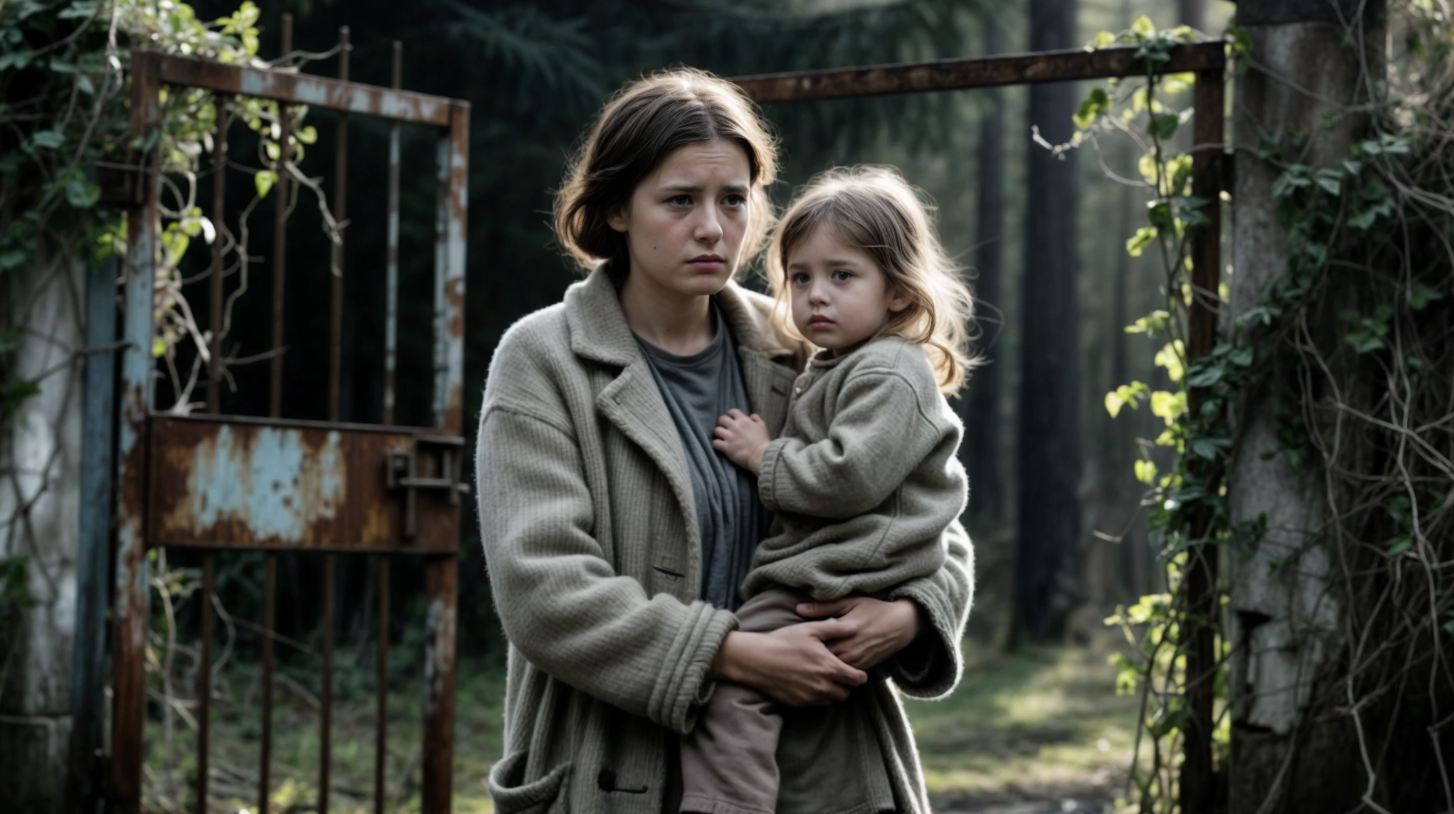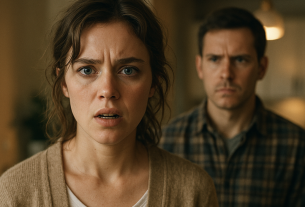The cedars rustled overhead as if trying to warn of something, their mighty branches swaying with the gusts, weaving a mysterious, almost mystical music. Liza had grown used to their language—the hiss in the wind, the creak of powerful trunks, the quiet whisper that told her stories through long winter evenings. Five years in this old forest hut had taught her to read the silence, to understand every note in the forest’s symphony. But that day was quieter than usual, strangely muffled, as if everything alive were holding its breath, waiting for something important. A long-suppressed ache—the very emptiness she had run from—stirred and throbbed with a new, piercing pain, reminding her of itself with fresh force.
She stepped out onto the porch to breathe in the fresh scent of pine after the recent rain—and froze, feeling an icy chill in her chest. At the gate, almost hidden by a thicket of ferns, stood a little girl. Three years old at most. In nothing but a torn calico dress, barefoot. Pine needles were tangled in her dark, matted hair, and an expression of solemn seriousness had settled on her face. She didn’t cry; she simply looked at Liza with enormous gray eyes, far too adult, eyes in which an endless universe of longing and hope seemed to ripple.
Liza’s heart—that frozen lump in her chest—quivered and cracked, and forgotten feelings poured through the fissure.
“Little one,” Liza’s voice rasped from long silence, like a rusty mechanism. “How did you get here? How are you alone out here in the wilderness?”
The child wasn’t frightened. She stretched out a tiny, dirt-smeared hand and pointed into the depths of the forest, to its most impenetrable thicket.
“Got lost,” she said quietly, and her small voice rang like a bell in the ringing stillness.
Two words. Just two. But they churned up in Liza everything she had so carefully buried: a fierce, animal maternal instinct—and terrifying memories of the maternity ward. The white walls, the silent doctors, the empty cradle. The man who wouldn’t meet her eyes, and his guilty silence, which had been a sentence, final and irrevocable.
“No,” her temples pounded, the word echoing through her empty head. “No, not this. I can’t, I won’t survive it.”
But her legs carried her to the gate despite her soul’s resistance. She approached, crouched down to bring herself level with the girl, to look into those bottomless eyes. The child didn’t draw back; she kept watching with wordless trust.
“What’s your name, sunshine?” Liza asked, and her own voice sounded strange to her, ghostly.
“Sonia,” the girl replied, and the name sounded like a promise of peace.
Liza picked her up. Her little body was light as a feather and icy from the autumn wind. Liza pressed her close, feeling the small, rapid heartbeat beneath the thin fabric of the dress. It beat in time with her own, which was bursting from her chest, trying to break free.
Inside the hut she lit the stove, warmed water, and washed Sonia clean. The dirt ran off, revealing pale skin crosshatched with tiny scratches, as if the forest had left its marks on her. She fed her warm porridge, and the girl ate greedily, like a little animal, with both cheeks full, as if she hadn’t eaten in days. Then Liza wrapped her in her own old, threadbare blanket and laid her on the bed, moving as quietly as she could.
Sonia fell asleep almost instantly, clutching Liza’s sleeve with her little hand, as if afraid Liza would disappear—melt away like a mirage.
Liza sat beside her and watched. She watched the dark lashes resting on her cheeks, the hair fanned across the pillow, the tiny fist. And for the first time in five years, the icy dam inside her trembled and collapsed. She wept. Quietly, soundlessly, letting the tears burn her cheeks and leave salty tracks on her tired skin. She wept for her son, whom she had never heard, never seen, never had time to hold. And for this stranger, this lost little girl, who had found her in the very depths of the forest—at the deepest point of her despair—like a ray of light in pitch-dark night.
In the morning she knew she had to go to the settlement. To hand the girl in. To tell the authorities. To give her to some stranger in a white coat who would take her away and perhaps find her real parents, return her to her accustomed world.
She dressed Sonia in the same torn dress, having first washed and dried it, and led her by the hand along the path. The girl walked silently, gripping Liza’s finger tightly, like a saving anchor.
At the police station, the young district officer, hearing her dull, cracked voice of agitation, lifted his eyes from tired, frayed papers.
“Found a child in the forest? By Devil’s Hollow? Who’d wander in there? There are bears about,” he said, looking in surprise first at Sonia, then at Liza, trying to make sense of the strange pair. “No documents on her? She didn’t give any names?”
“Sonia,” Liza said softly, stroking the girl’s head. “She said her name was Sonia.”
The officer wrote something in a thick ledger, then stepped out, leaving them alone in the office that smelled of dust and cold coffee. Liza stared through the dusty window, feeling the small palm clutch her finger more tightly—as if sinking its last hope into it. She was afraid to turn around. Afraid to see those gray eyes full of a silent question.
The officer returned with a colleague—senior in rank, a man with a weary but perceptive gaze. He studied Liza, then the child, weighing the situation.
“Citizen Orlova? You live alone in that forest hut, if I’m not mistaken? For a long time now?”
Liza nodded, unable to utter a word, her throat constricted by a spasm.
“And the child… is she yours?” There was no accusation in the policeman’s voice—only a strange, wary gentleness, an understanding.
“No,” Liza breathed, and the word cost her unbelievable effort. “I found her yesterday. At the gate.”
The policemen exchanged glances, and something important flickered between them—something only they understood.
“The thing is,” the senior began carefully, looking off to one side, “yesterday there was an operation in the Devil’s Hollow area. A smuggler gang. They were caught, but they managed to hide part of the cargo. And… one child. A girl. Her mother, one of the gang members, was killed during the arrest. We’ve been searching for the girl all weekend. And it turns out she came to you. On her own.”
Liza was struck dumb, her world narrowing to a point. She turned her head slowly, fighting the resistance of every cell in her body. Sonia was looking up at her with those enormous eyes. And in their depths Liza saw not childish fear but an ancient, all-understanding grief. A grief she recognized as her own, reflected in the small mirror of a child’s soul.
“Will they… will they take her?” Liza asked quietly, her voice trembling.
“To an orphanage, yes. It seems she has no relatives. No one left.”
The words “to an orphanage” sounded like a sentence—heavy and merciless. Not for Sonia. For Liza herself. She imagined returning to her hut, to her silence, to her grief. To an emptiness that would now be even more terrible—because for a moment it had been filled with warmth, light, and the soft, trusting breath of a child.
And then Sonia, who hadn’t said a word all this time, suddenly lifted her head and said clearly, loudly, filling the entire office:
“Mom.”
Liza gasped, feeling the ground slip from under her feet. The officers froze, stunned.
“Mom,” Sonia said again, gripping Liza’s hand even tighter, clinging with a force no child should have.
It wasn’t a plea anymore. It was a declaration. A sentence of a different kind—one that brought not pain, but release.
Liza’s heart broke and came together again, larger, stronger, capable of loving for two. In the very moment she had lost everything, life hadn’t given her a replacement—it had given her a new love. Another wounded but equally lonely soul that needed saving.
She lifted her head and looked at the senior officer. In her eyes—dried from tears and bitterness—a long-forgotten fire had flared to life: the fire of resolve, the fire of living.
“I… I want to keep her. To adopt her. She’s mine now. I won’t give her up.”
The process was long and ant-like—full of papers, inspections, and endless waiting. But the forest hut, which for five years had been a tomb for her hopes, suddenly came to life, filling with new colors and sounds. It smelled of porridge again; there was a child’s laughter; handmade toys of cones and twigs lay scattered on the floor. Liza didn’t find her son. But she found her daughter—lost not only in the forest but in life. Just as she herself had been, many years before.
And when in the evenings they sat on the porch and Sonia, wrapped in that same blanket, nestled against her, Liza understood—she hadn’t simply saved the girl. The girl had saved her. Had led her out of the worst forest—the thicket of her own despair, fear, and loneliness—giving her a new chance at life.
Time flowed differently now, not as viscous, empty years but as days brimming to the rim, every moment precious. The hut no longer creaked with loneliness—it buzzed like a hive, filled with laughter, conversation, and the patter of small feet. At first Liza fenced off a corner, making a semblance of a room for Sonia. She nailed together a bed from old boards and sewed a quilt from scraps, each piece holding a memory of a former life. Every stitch, every stroke of the hammer drove off the ghosts of the past, filling the space with new, bright memories.
Sonia proved to be a quiet but stubborn child, her character tempered by early trials. She didn’t ask about her first mother, didn’t cry at night from homesickness. But for the first months she wouldn’t let Liza out of her sight, clinging to her skirt like a burr, afraid to lose her only anchor. She slept gripping Liza’s hand like a lifeline. Sometimes she woke with a soundless cry, and then Liza would sit beside her, stroke her hair, and sing old lullabies—the ones she had once prepared for another child who had never heard them.
The official chores were ant-like, persistent; they demanded patience and strength. Social workers, inspections, papers, endless questions. Liza, unaccustomed to people, learned again to speak, to smile, to prove her fitness. She saw the doubts in their eyes: a solitary hermit woman, a history of psychological trauma… But they didn’t see how Sonia bloomed day by day. How the frightened recluse disappeared, and in her place stood a lively, curious, joyful girl who had learned to trust the world again.
One day Liza took Sonia with her to pick bilberries, to the richest patches. They wandered far, to a lake Liza hadn’t visited since she had withdrawn from the world, hiding from pain. The water was black and motionless, like polished glass, reflecting the sullen sky.
“Mom,” Sonia said—calling her that for the first time without a trace of fear, simply as an indisputable fact, an axiom of being—“where did I come from?”
Liza froze with a full tin in her hands, feeling the ground shift slightly beneath her. The old pain, familiar as a faded scar, pricked under her ribs. But no longer with destructive force—rather like a sad memory.
“You got lost,” Liza said softly, setting the tin aside. “And I found you. Sometimes… sometimes that’s how it happens. People lose their way so they can find each other. So they’ll never be alone again.”
Sonia looked at her intently with those wise, all-understanding eyes in which the lake’s surface was reflected.
“And did you get lost too? Long ago?”
Liza knelt in the cold, springy moss to be level with her, to look straight into those bottomless eyes.
“Yes, my girl. I lost my way a very long time ago. In my grief. In my sorrow. And you found me and led me into the light. You’re my truest guide.”
The girl threw her arms around Liza’s neck and pressed her cheek to her, sharing her warmth and boundless trust. Her breath was warm and steady. And in that moment Liza finally let the past remain the past, slip into oblivion. It was no longer an open, bleeding wound. It had become part of her story—the part that led her here, to this lake, to this child, to this new meaning of existence.
Life went on, gathering pace like a spring brook. Liza taught Sonia to read from old, dog-eared books left by former owners, opening for her the magical world of literature. They planted potatoes together in the tiny garden patch, and Sonia dug in the earth with her little spade, serious and diligent. In winter, when blizzards buried the hut up to the windows, making a cozy isolation, they drank tea with raspberry jam and Liza told stories—not from books, but her own—about the kind spirits of the forest, about talking cedars, about lost stars that descend to the earth and become children, bringing happiness.
Years passed, measured by the ticking of the old clock and Sonia’s growth. One early autumn day, when the cedars stood in golden attire and the air was clear and ringing, a man came up to the gate. He wasn’t local—city overcoat, gray at the temples betraying his age and his anxieties. Liza, stepping out for firewood, froze on the threshold and let a log slip from her hands. She recognized him, though time had changed his face, making it harder and older, scoring deep lines. It was Dmitry. Her former husband.
He looked at her, not daring to step through the gate, as if an invisible barrier stood before him.
“Liza,” his voice broke, hoarse and unrecognizable. “They told me… that you’re here. That you have… a child. A girl.”
At that moment eight-year-old Sonia darted out from behind Liza—tanned, wind-tousled hair, holding a homemade bow Liza had fashioned for her from a flexible willow twig.
“Mom, who is that?” she asked, hiding behind Liza’s back and staring at the stranger with irrepressible curiosity.
Dmitry looked at the girl, and there was so much pain, confusion, and some pitiful, naive expectancy in his eyes that Liza’s heart tightened—not from old love, but from human pity, from understanding his torment.
“Come in,” she said softly, stepping back into the shadow of the entryway.
He sat at the table, turning a clay mug in his hands, not knowing where to begin. Sonia, catching a barely perceptible sign from Liza, reluctantly went to her little room, but Liza knew—she stood behind the thin door, listening with bated breath.
“All these years I…” Dmitry began and fell silent, struggling for words. “I looked for you, Liza. After… after everything happened… I broke. I couldn’t forgive myself for not protecting you. For not supporting you then. I was a coward. I was afraid of grief, afraid of your look.”
Liza was silent, gazing at his bent back. The anger and resentment she had carried all these years turned out to be dry husks—dust. They crumbled at the touch of the living, unspoken sorrow in his eyes, at the sight of sincere remorse.
“She… looks like you,” he nodded toward the door behind which Sonia was hiding.
“She’s not my blood, Dmitry. She’s a stranger—on paper. But she’s mine. With all my soul. With every cell.”
He nodded in understanding, running his hand down his face. Then he told her he had married again, tried to start over, to forget the past. But it didn’t work, didn’t take. His wife left, there were no children, it never happened. And he was left alone with his grief, which never released him, never gave him a chance at redemption.
“I didn’t come to ask for anything, to take anything back,” he said, lifting tired eyes to her. “I just wanted… to see. To know that you’re alive. And that you… are all right. That you found your peace.”
He left before sunset, when the sun was already brushing the tops of the cedars, painting everything crimson. Liza and Sonia stood on the porch and watched his figure dissolve in the evening shadows of the forest, becoming part of the landscape.
“Mom, did he hurt you? Long ago?” Sonia asked quietly, hugging Liza around the waist.
Liza hugged her back, pressing her close, feeling the warmth of the dearest being. Her daughter. Her salvation. Her meaning.
“No, my sunshine. He, too, once lost his way. Not everyone finds the road back. Not everyone has the strength and courage.”
That night was the last time Liza dreamt the old exhausting nightmare—the hospital, the white walls, the silent doctors, the crushing silence. But this time, as she fled that building in her dream, she saw on the threshold a little girl with gray eyes who was reaching out a hand to her and smiling, lighting everything around with her light.
In the morning she woke to a gentle tickle—Sonia, already dressed, was poking her cheek with a fluffy dandelion she’d picked the day before.
“Get up, Mom! The cedars are whispering that today will be the coolest day! The very best!”
Liza laughed—a happy, light laughter she hadn’t heard from herself in a long time—stretched, and hugged her daughter, her life, her second wind. They were two souls who had lost their way and found each other in the thickets of life. And their shared story was only beginning, promising new chapters full of light and hope.
And then the time came, and Sonia, now grown and confident, brought home the person who became her happiness. And when Liza—now a grandmother—rocked her little grandson in her arms and watched her daughter and son-in-law stoke, by the gate, that very same fire where a frozen child’s heart had once been warmed, she understood. Life isn’t linear; it’s a whirl. And the most important thing isn’t to avoid pain, but to learn to grow a garden in the ashes of your heart. Her garden was in bloom. Its scent was sweet and everlasting. That was the one true victory: the victory of love over every storm



